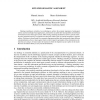133
click to vote
EUMAS
2006
15 years 3 months ago
2006
Ontology matching is currently a key technology to achieve the semantic alignment of ontological entities used by knowledge-based applications, and therefore to enable their inter...
108
click to vote
EUMAS
2006
15 years 3 months ago
2006
One of the major puzzles in performing multi-agent-based simulations is the validity of their results. Optimisation of simulation parameters can lead to results that can be deceit...
117
click to vote
EUMAS
2006
15 years 3 months ago
2006
Forming effective coalitions is a major research challenge in the field of multi-agent systems. Central to this endeavour is the problem of determining the best set of agents that...
109
click to vote
EUMAS
2006
15 years 3 months ago
2006
This article presents a multi-agent method to tackle multidisciplinary optimisation, based on the notions of cooperation and self-regulation. It is focused on the preliminary airc...
138
click to vote
EUMAS
2006
15 years 3 months ago
2006
In a normative society there are two main problems: defining norms and enforcing them. Enforcement becomes a complex issue as societies become more decentralized and open. We propo...
102
click to vote
EUMAS
2006
15 years 3 months ago
2006
This paper explores a general model of economic exchange between heterogeneous agents representing firms, traders, or other socioeconomic entities, that self-organise into coaliti...
EUMAS
2006
15 years 3 months ago
2006
Norms constitute a powerful coordination mechanism among heterogeneous agents. We propose means to specify and explicitly manage the normative positions of agents (permissions, pro...
138
click to vote
EUMAS
2006
15 years 3 months ago
2006
Current IT application domains such as web services and autonomic computing call for highly flexible systems, able to automatically adapt to changing operational environments as w...
107
click to vote
EUMAS
2006
15 years 3 months ago
2006
We derive optimal bidding strategies for a global bidder who participates in multiple, simultaneous second-price auctions with perfect substitutes. We first consider a model where...

